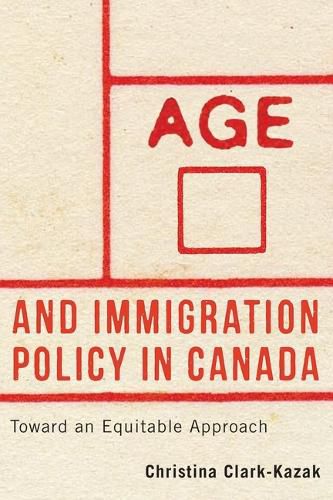Readings Newsletter
Become a Readings Member to make your shopping experience even easier.
Sign in or sign up for free!
You’re not far away from qualifying for FREE standard shipping within Australia
You’ve qualified for FREE standard shipping within Australia
The cart is loading…






The first comprehensive analysis of age discrimination in Canadian immigration law, exposing injustices and advocating for a fairer, rights-based approach. How does age shape who can enter, settle, and access supports in Canada? Discrimination based on age and family status is deeply embedded in the country's immigration system, yet it remains largely unexamined.
Drawing on archival research, case studies, and interviews with lawyers, former public servants, and settlement workers, Christina Clark-Kazak unpacks the explicit and implicit justifications for age qualifications in the Immigration and Refugee Protection Act and its regulations. Focusing on the comprehensive ranking or point system, immigrant detention, and refugee protection, she demonstrates how ageist structures are not only normatively problematic but also context-specific, inconsistent, and arbitrary--a mechanism to exclude certain groups of migrants or to absolve the state of responsibility for immigrant supports.
Using the concept of social age--the socially constructed roles and norms attributed to different stages of life--Clark-Kazak argues that immigration policies fail to reflect the diversity of experiences across the life course. This book advocates for a more equitable approach that aligns with the Canadian Charter of Rights and Freedoms and rights-based international norms, offering an urgent call to rethink the role of age in shaping migration policy.
$9.00 standard shipping within Australia
FREE standard shipping within Australia for orders over $100.00
Express & International shipping calculated at checkout
The first comprehensive analysis of age discrimination in Canadian immigration law, exposing injustices and advocating for a fairer, rights-based approach. How does age shape who can enter, settle, and access supports in Canada? Discrimination based on age and family status is deeply embedded in the country's immigration system, yet it remains largely unexamined.
Drawing on archival research, case studies, and interviews with lawyers, former public servants, and settlement workers, Christina Clark-Kazak unpacks the explicit and implicit justifications for age qualifications in the Immigration and Refugee Protection Act and its regulations. Focusing on the comprehensive ranking or point system, immigrant detention, and refugee protection, she demonstrates how ageist structures are not only normatively problematic but also context-specific, inconsistent, and arbitrary--a mechanism to exclude certain groups of migrants or to absolve the state of responsibility for immigrant supports.
Using the concept of social age--the socially constructed roles and norms attributed to different stages of life--Clark-Kazak argues that immigration policies fail to reflect the diversity of experiences across the life course. This book advocates for a more equitable approach that aligns with the Canadian Charter of Rights and Freedoms and rights-based international norms, offering an urgent call to rethink the role of age in shaping migration policy.